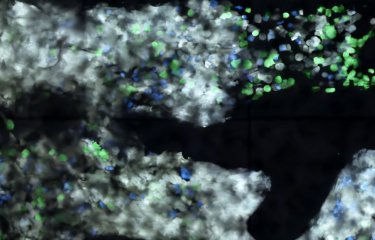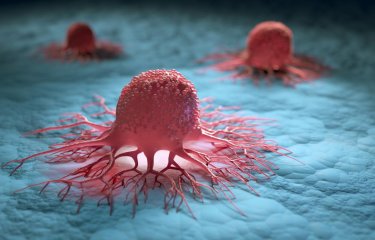Immunotherapy, or the notion of "retraining" patients' immune systems, constitutes a major step forward in the fight against cancer. Although the results of CAR T cell therapy are very positive, its efficacy is still difficult to predict. Research by scientists at the Institut Pasteur has improved our understanding of how these cells function.
One immunotherapy strategy involves genetically reprogramming patients’ T cells (also known as "killer T cells"). Cells are reprogrammed to express a chimeric antigen receptor (CAR), enabling recognition and focused destruction of tumor cells that express a target molecule.
CAR T cells – a promising yet unpredictable therapeutic tool
Therapeutic results for CAR T cell therapy have been impressive, paving the way to its market launch in France in 2018 for the treatment of blood cancer (B-cell lymphoma and leukemia) in children and adults. However, the success rate of treatment with CAR T cells varies considerably among patients. The composition of the CAR T cell product administered by intravenous infusion (i.e. patients' T cells that are collected, modified in culture, multiplied, and reinjected into the patient) is probably partly responsible for the wide variety of responses.
Improved understanding of interaction between CAR T cells and tumors
The Dynamics of Immune Responses Unit at the Institut Pasteur has combined innovative imaging techniques and various tools providing in vivo information at single-cell level to identify how various subpopulations of CAR T cells behave within the tumor microenvironment. The results have revealed that CD4+ CAR T cells and CD8+ CAR T cells exhibit highly complementary functions, specializing respectively in immune activation and the destruction of tumor cells. Moreover, CAR T cells, which had previously been regarded as killer cells functioning completely autonomously, have seen their mechanism of action redefined by this research. The research has revealed that CAR T cells interact closely with the tumor microenvironment through the production of a cytokine (interferon gamma) and that this interaction is essential for CAR T cells’ therapeutic action.
This more detailed understanding of CAR T cells' mechanism of action paves the way to new opportunities for further improving their therapeutic efficacy.
Source :
A cross-talk between CAR T cell subsets and the tumor microenvironment is essential for sustained cytotoxic activity, science immunology, 26 Mars 2021
Morgane Boulch1,2*, Marine Cazaux1,2*, Yann Loe-Mie3, Ronan Thibaut1, Béatrice Corre1, Fabrice Lemaître1, Capucine L. Grandjean1, Zacarias Garcia1, Philippe Bousso1
1Dynamics of Immune Responses Unit, Equipe Labellisée Ligue Contre le Cancer, Institut Pasteur, INSERM U1223, 75015 Paris, France.
2 University Paris Diderot, Sorbonne Paris Cité, Paris, France.
3 Institut Pasteur, Hub Bioinformatique et Biostatistique, Département de Biologie Computationnelle (USR 3756 IP CNRS), Paris, France.
*These authors contributed equally to this work.
This study is part of the Cancer Initiative of the Institut Pasteur's strategic plan for 2019-2023.





